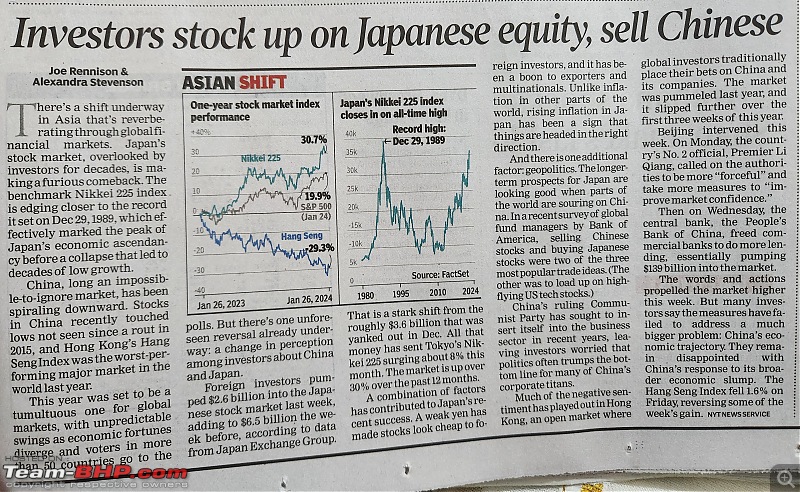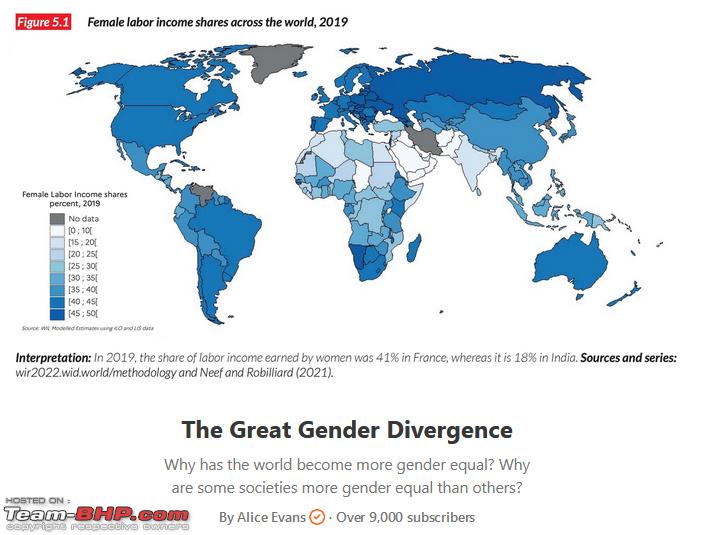Quote:
Originally Posted by Jeroen  The one thing keeping more women from working is men! It is that simple. |
No, it is not that simple. For someone from patriarchal society, it may appear like a simple truth. But you need to consider what usually happened when power is on the other side.
I belong to a matrilineal community, where women inherited all the property, and men got nothing. The Hindu Succession Act, 1956 changed the legal status of this inheritance, making it equal for men and women. However, the old rules were still applicable to disputes raised until the end of 20th century. For example, there was a property dispute case regards to my great-grandmother's property [note: not great-grandfather's], which was filed in 1998, and finally ended in 2016. She had 3 daughters and 1 son. The son's family got 2.8% of the property according to the old rules, and not 25% as one would expect based on new rules.
Even in the families that don't go to court, daughters still get the lion share of the property. The sons usually don't mind because it is the community tradition, it is considered quite shameful to demand equal share as sisters as the law mandates. The matrilineality is quite common in Kerala too, but I am not sure how they practice it now.
How does the above information matter to the question at hand? Economic power entirely shifts the power dynamics within the family. Women in such communities never let men decide their fate. Husbands and sons don't get to decide unilaterally on any important decision unless the wife or mom allows. I have been at the receiving end of this all my life.

But this doesn't mean women in matriarchal societies were all like Xena the warrior princess. Biology matters. Dangerous jobs or jobs that need extended time away from home were mostly handled by men with no economic power. In this respect, it was not different than patriarchal society, because biology doesn't change.
Let me quote a
professional from Psychology Today:
Quote:
|
Of the individuals who work in the four most dangerous jobs, more than 90% are men. Consequently, across all occupations, men are much more likely than women to be killed on the job. In 2017, for example, 4,761 men were killed at their workplace, compared to just 386 women. The fatality rate for men that year—5.7 deaths per 100,000 workers—was nearly 10 times greater than the fatality rate for women, 0.6 per 100,000 (DeVore, 2018).
|
When I was in engineering college in the 80s, one could see highly skewed gender ratio across branches. While computer science and electronics branches had equal or more girls than boys, the mechanical and civil branches had 95:5 or even higher skew favoring boys. Why did this happen?
Why did women's share in labour participation dramatically start rising in 20th century and continues increase even now? Because most jobs created in 20th century and later were indoor jobs, which made biological differences lot less relevant while doing those jobs. This explains the skew in engineering branches.
Why most pediatricians, caretakers and kindergarten teachers are women? Because these are emotional work, and women gravitate towards such professions. Meanwhile most surgeons are men, because you don't need to emote with your customers. I have male surgeon friends who casually mention they did 6-8 surgeries that day, there is no emotional attachment.
Iceland is THE most gender equal country. How are jobs distributed across industry there?
https://www.statista.com/statistics/...dustry-gender/
Let's look at the 3 industries with high skew, marked in red. It that patriarchy at work?


 (2)
Thanks
(2)
Thanks
 (2)
Thanks
(2)
Thanks

 (1)
Thanks
(1)
Thanks
 (3)
Thanks
(3)
Thanks

 (2)
Thanks
(2)
Thanks
 (4)
Thanks
(4)
Thanks

 (13)
Thanks
(13)
Thanks

 (7)
Thanks
(7)
Thanks

 (4)
Thanks
(4)
Thanks

 (1)
Thanks
(1)
Thanks

 (3)
Thanks
(3)
Thanks

 (6)
Thanks
(6)
Thanks

 (4)
Thanks
(4)
Thanks

 (5)
Thanks
(5)
Thanks

 (2)
Thanks
(2)
Thanks








